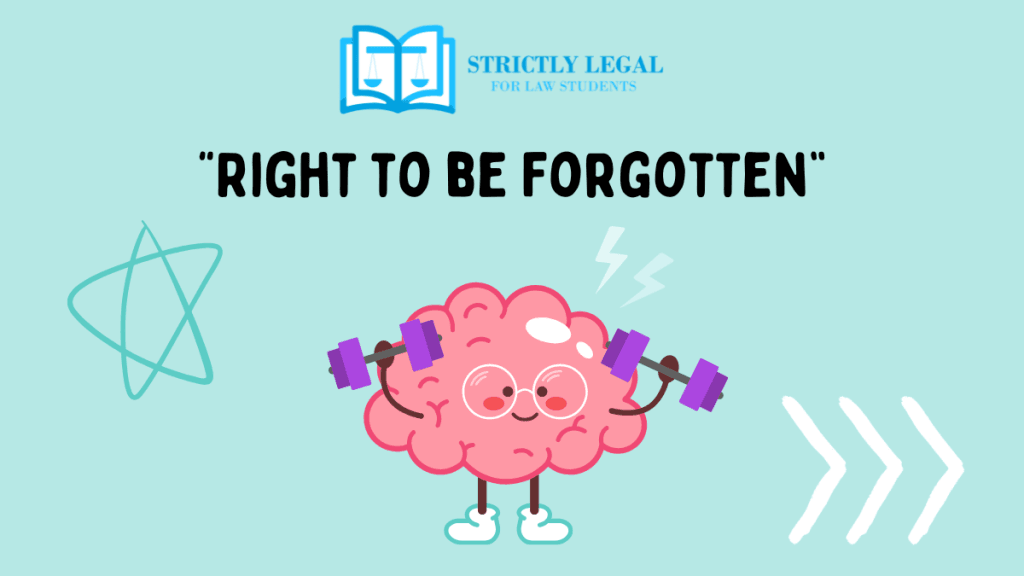In the age of digital information, where every click, post, and interaction is recorded, the concept of the “Right to be Forgotten” has gained significant attention worldwide. This idea, which primarily revolves around individuals’ right to have their personal data removed from the public domain, intersects with crucial issues such as privacy, data protection, and freedom of speech. While the Right to be Forgotten is well established in some countries, such as in the European Union, its application and recognition in India are still evolving. This article delves into the concept of the Right to be Forgotten, its relevance in the Indian context, and the legal frameworks that could shape its future.
Table of Contents
What exactly is this Right?
The Right to be Forgotten (RTBF) refers to the ability of individuals to request the removal or de-indexing of their personal information from online databases, search engines, or websites. This concept is rooted in the idea that individuals should have the right to control their personal data and prevent it from being perpetually available online. RTBF has garnered significant attention in the European Union, following the 2014 judgment by the Court of Justice of the European Union (CJEU) in the case of Google Spain SL, Google Inc. v. Agencia Española de Protección de Datos (AEPD). The Court ruled that individuals could request search engines to remove links to certain personal information if it was “inadequate, irrelevant, or no longer relevant.”
Need for this “Right” in India
As India is rapidly becoming a digital powerhouse with a massive population engaged in online activities, the issue of online privacy and data security has become more critical. The digitalization of personal information, including social media activity, news reports, and academic records, has led to concerns regarding data permanence and privacy breaches. In a country with a vast digital presence, citizens should be empowered to request the removal of personal data that is outdated, irrelevant, or has been published without consent.
Protection of fame and reputation
In a world where defamation and false information can spread rapidly online, individuals may find themselves suffering from the consequences of outdated or inaccurate content associated with their name.
Privacy Concerns
With an increasing number of people using social media, mobile applications, and e-commerce platforms, the volume of personal data being shared is immense. The RTBF helps in securing one’s personal privacy and preventing data exploitation.
Data Security
Given the increasing concerns over data breaches and cybercrimes, the RTBF could offer a legal recourse to remove information that could potentially harm an individual if exposed or misused.
Is this Right recognized in India?
In India, the Right to be Forgotten is not explicitly recognized under any statute. However, the right to privacy has gained increasing prominence, especially after the 2017 judgment in K.S. Puttaswamy v. Union of India, where the Supreme Court of India declared the right to privacy as a fundamental right under the Constitution. This judgment provides a constitutional basis to argue for the protection of personal data, including the right to seek the removal of irrelevant or harmful information.
The Digital Personal Data Protection Act, 2023(DPDP Act)
In 2019, the Digital Personal Data Protection Bill (PDPB) (now Act)was introduced in India to provide a comprehensive framework for data protection. The Bill, which is currently under review, touches upon various aspects of personal data handling, processing, and storage. One of the key provisions in the Act is related to the right to correction and erasure of personal data, which aligns with the Right to be Forgotten. Section 20 of the DPDP Act allows individuals to seek the correction or erasure of their data from data fiduciaries (entities handling the data) when such data is inaccurate or outdated. However, this provision does not explicitly establish a broad Right to be Forgotten akin to that of the European Union’s General Data Protection Regulation (GDPR).
Challenges for implementation of the said Right in India
Balancing Freedom of Expression:
One of the biggest challenges is maintaining the balance between the right to privacy and freedom of expression. Media, journalists, and public figures often raise concerns about their ability to freely report or share information, which could be hindered by RTBF claims. The law must ensure that it does not undermine press freedom or limit the flow of information that serves the public interest.
Scope and Definition:
Unlike the European Union, which has an established framework under the GDPR, India currently lacks clear guidelines or a framework for determining what qualifies as “irrelevant” or “excessive” personal data. Legal ambiguity surrounding this issue could lead to misuse or over-application of the right.
The Technology Issue:
The internet is a decentralized and vast network, and removing content from the internet may be a near-impossible task. Once information is published online, it can be copied, redistributed, and stored in multiple locations beyond the control of the data owner. This raises the question of whether RTBF can truly be effective in such a digital ecosystem.
Data Sovereignty:
Given that the majority of online platforms are based outside India (such as Google, Facebook, and Twitter), enforcing the RTBF for Indian citizens may be challenging without global cooperation. There would need to be international treaties and regulatory mechanisms to ensure that individuals’ rights are upheld across borders.
Conclusion
The Right to be Forgotten represents a significant step towards protecting an individual’s privacy in the digital age. While India’s legal framework on this issue is still in the nascent stages, the growing emphasis on data protection, privacy rights, and the regulation of digital platforms signals a movement towards stronger safeguards for online individuals’ rights. As technology and digital media continue to evolve, it is likely that the Right to be Forgotten will become an integral part of India’s legal landscape, shaping how personal data is managed and protected in the future.

Law student.
Turning legal insights into engaging narratives.





